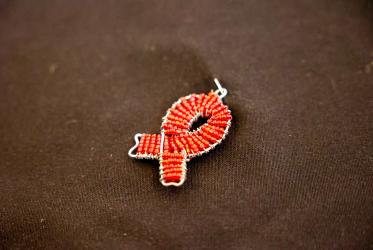Ayoko Bahun-Wilson is regional coordinator for West Africa for the World Council of Churches (WCC) Ecumenical HIV and AIDS Initiatives and Advocacy programme. She hosted a weekly radio show for churches in Benin called “Zero Rape, Zero Violence.” The show was offered in collaboration by the WCC, Deborah Network, INACES and Hosannah Radio.
Below, Bahun-Wilson reflects on how the radio show, offered every Wednesday for three months, has heightened awareness—but there are many challenges that remain.
What are some of the current situations in Benin with regard to sexual and gender-based violence?
Bahun-Wilson: Violence against women and girls reflects the violence that exists in societies. In Benin, a demographic and health survey conducted in 2019 highlighted the challenges. The survey provided information on physical, sexual and couple violence against women. More than one-fourth of women (15-49) said they had experienced physical violence at some point in their lives. This situation becomes difficult when the girls live in a context of forced marriage or child marriage.
What is the goal of the radio show “Zero Rape, Zero Violence?”
Bahun-Wilson: The overall objective is to speak out and reduce sexual and gender-based violence in Benin. In addition, the radio show aims to encourage the community to really address issues of sexual and gender-based violence, HIV, and lack of services and care. The show highlights nonviolent men and women as role models to help build the capacity by challenging behaviour, and also engages leaders from various backgrounds. The show has increased awareness, particularly among young people. There was strong positive feedback from the audience, and a webinar is scheduled on 19 June to help further evaluate the show’s impact.
Has COVID-19 led to a rise in sexual and gender-based violence in Benin?
Bahun-Wilson: For safety and in order to reduce the spread of the pandemic, one of the measures adopted by governments is the restriction of movement to the minimum, or lockdown, which often changes gender roles in the homes, and involves a curfew. These measures are not without consequences on the social, economic and psychological lives of families. Among these consequences, we can mention reduction of resources, unemployment, promiscuity, and high levels of anxiety and anger. The coronavirus pandemic has increased the vulnerability of women and girls and the risks of assault and other forms of violence.
COVID-19 has led to more physical beatings, emotional violence, and economic violence in society due to the fact that many women (traders) have been deprived of their income-generating activities with the lockdown. Women with small businesses (selling in the markets, on the streets, in schools, near offices) have seen a drastic reduction of their income. This has added to the social stress combined with increasing tension in having the family constantly at home with limited access to food and leisure.
Churches are closed, and most women cannot go anymore to their support groups where they usually pray together, and find solace and support from friends.
What gives you hope amid these very trying times?
Bahun-Wilson: With faith, all is possible and any difficult situation can change and can see improvement. With faith, people stand together to show solidarity to survivors of sexual and gender-based violence, to share a sense of love.
The spirit of ubuntu, the togetherness that gives hope in the time of crisis, is what empowers us! It is important that we are one, understanding the issues, empowering one another, equipping people, educating people and sharing lessons learnt. Without ignoring the realities or downplaying the situation, we are convinced that all will be well with the grace of our God, who is the creator and life giver.
Information is power! Therefore, ensuring that all have the correct information and use it appropriately is important for us to move on and change the world. The WCC Ecumenical HIV and AIDS Initiatives and Advocacy programme continues to provide life-giving messages in this time of COVID-19. We have not forgotten all the lessons learnt, the best practices from our work on HIV and how together, we can beat the stigma and the discrimination associated with COVID-19.






